Continued from Page 1:
- Overview of Bus Contracting Model
- Tendering Process
- BCM Route Packages
- List of Bus Packages
- Former Bus Package Terms
Advantages of the BCM
The gross-cost contracting model, currently utilized in London and various Australian cities, serves as a model for LTA’s transportation systems. With this model, the government can directly subsidize bus operations to maintain better service levels, even if such levels are unprofitable.
The advantages of this system are:
- Enhances the Government’s capacity to swiftly address fluctuations in travel demand and service expectations.
- Allows bus operators to concentrate on running bus services and fulfilling service standards.
- Reduces entry barriers, fostering increased market competition that leads to the provision of better bus services in a cost-effective manner, benefiting commuters.
Commuters stand to benefit from:
- A more responsive system that adjusts to changes in ridership patterns and commuter requirements.
- Greater competition and efficiency within the bus industry.
- Improved reliability and service levels of bus services.
- Reduced waiting times between buses.
Higher Service Levels
With the transition to a bus contracting model, the Government intended to also raise bus service levels beyond those of the expanded BSEP.
| Pre-BCM | Expanded BSEP | Bus Contracting Model |
| About 30% of bus services operate at headways of no more than 10 minutes | About 35% of bus services operate at headways of no more than 10 minutes | At least 50% of bus services operate at headways of no more than 10 minutes |
| 100% of bus services operate at headways of no more than 30 minutes | 100% of bus services operate at headways of no more than 20 minutes | 100% of bus services operate at headways of no more than 15 minutes, and all Feeder Services operate at intervals of 6 to 8 minutes. |
As a result, an estimated 45% of bus services will have shorter intervals during peak periods when compared to the expanded BSEP service levels.
Safeguarding employee welfare
Bus industry employee safeguards (Click to expand)Each new tender or alteration in a contract for bus services may lead to the transfer of bus employees between employers. To safeguard the welfare of these affected employees and ensure their smooth transition to the incoming operator, the Public Transport Tripartite Committee (PTTC) issued the Guidelines on Good Employment Practices in the Public Bus Industry (the “Guidelines”) on 16 September 2014.
These guidelines delineate the obligations and responsibilities of both incoming and outgoing bus operators. They cover various aspects such as the timeline for offering employment, recognition of length of service, protection of employment terms, treatment of affected bus industry employees (including those opting to remain with the outgoing operator), and training for those choosing to join the incoming operator.
The PTTC has proposed three key assurances:
- All affected employees must receive a job offer from the incoming operator.
- Affected employees must be provided with employment terms that are not inferior to those they enjoyed before the transition.
- Affected employees can opt to join the new operator or be redeployed by their current employer, where feasible.
These employee-related aspects of the Guidelines have been integrated into LTA’s tender documents and will also be incorporated into LTA’s subsequent contract with the Operator.
Tendering Process
LTA evaluates tender submissions using a 2-envelope process, considering both quality and price, with a higher emphasis placed on the quality proposals submitted by the tenderers. Tendering requirements include, among other criteria, a demonstrated track record of operating a fleet of at least 250 buses.
LTA awards route packages (tenders) based on a “Gross Cost Model.” The operator to whom the tender is awarded must establish a local company to manage the Route Packages, with senior management overseeing operations based in Singapore for enhanced oversight and accountability.
Provisions for additional bus capacity will be included in the contract, allowing the government to promptly adjust Route Packages as needed in response to changes in ridership and commuter needs.
Throughout the contract period (5-7 years), the service fee, which constitutes the operator’s bid price for the package, will be adjusted to better reflect the operating environment, considering factors such as inflation, changes in wage levels, and fuel costs. The Operator will receive the service fee on a monthly basis, with deductions for non-operated mileage under its control, such as driver absenteeism.
Additionally, the Operator can access the Bus Driver Training Grant for new bus drivers trained and deployed on the bus services, for a period of time after the contract award date.
Contract Extensions
When choosing between a contract extension and a competitive tender, LTA considers several factors such as such as the prevailing market condition and impact to operations. This was revealed by a LTA spokesperson as part of an article by The Straits Times in December 2024.
SBS Transit – Negotiated Contract Packages
In November 2021, LTA announced that the Downtown Line would transition to New Rail Financing Framework (NRFF) Version 2 starting in January 2022. As part of this agreement between LTA and SBST, SBST agreed to a revised service fee rate for five of its existing bus contracts that is lower than the current service fee and is benchmarked against recent bus tenders. The five contracts were also extended by an average of three years at these revised rates. [LTA Press Release]
These five bus contracts were not stated in the LTA press release but were revealed in an article from The Straits Times [Straits Times article]. The exact number of years extended for each affected bus package was also not disclosed.
- PT211 – Bedok Bus Package (originally ending in 2023)
- PT207 – Tampines Bus Package (originally ending in 2024) — Extended by 1 year 10 months to July 2026
- PT209 – Serangoon-Eunos Bus Package (originally ending in 2025) — Extended by 1 year 9 months to June 2027
- PT210 – Clementi Bus Package (originally ending in 2025)
- PT208 – Bishan-Toa Payoh Bus Package (originally ending in 2026)
In the SBS Transit Annual Report 2023, SBS Transit revealed that the expiry dates of the bus packages operated by the company range between 2024–2030, roughly consistent with the contract extensions revealed in 2021. It is not known if additional negotiated extensions have been conducted between 2021 and 2024.
The Sengkang-Hougang Bus Package originally ended in 2021 under the first negotiated contract term of the Bus Contracting Model with SBS Transit. In October 2021, the Negotiated Contract was revealed to be extended by 3 years by LTA from 2021 to 2024, in an article (Jury still out on Singapore’s bus contracting model, five years on) by The Straits Times. By August 2024, with no news pertaining to this contract, it is believed that this contract has been extended by LTA yet again for an undisclosed duration.
SMRT – Negotiated Contract Packages
In September 2023, the Straits Times reported that SMRT’s Woodlands and Choa Chu Kang-Bukit Panjang packages were extended by three years until August 2026 [Straits Times article].
Tendered Contract Packages
Loyang Bus Package
Go-Ahead Singapore received a two-year contract extension in 2020 to operate PT201 Loyang Bus Package until September 2023.
In September 2022, a further 3-year contract extension for PT201 Loyang Bus Package was mentioned in a LinkedIn post by Louis Rambaud, Group Strategy & Transformation Director of The Go-Ahead Group plc, and later confirmed by The Straits Times. This was the first time a tendered bus contract had been extended beyond the stipulated contract duration of up to seven years.
Seletar Bus Package
In May 2022, SBS Transit revealed in a 1st Quarter 2022 Business Update that it had been granted a two-year extension for PT202 Seletar Bus Package.
Bukit Merah Bus Package
SBS Transit’s 2022 Annual Report mentioned that “the contract for the Bukit Merah Bus Package will end in April 2024”, implying a contract extension of 5 months, since the original PT203 contract commenced in November 2018 and was due to end in November 2023.
Bulim Bus Package & Sembawang-Yishun Bus Package
On 21 May 2025, Tower Transit announced in a Linkedin Post that the Land Transport Authority has exercised the option to extend the Bulim Bus Package & Sembawang-Yishun Bus Package for 2 years to 2028.
Dual-Depot Arrangements
To reduce dead mileage, some existing long-distance trunk services operated by SBST and SMRT are dual-depot controlled to reduce dead mileage; meaning that buses are dispatched from two depots instead of just one. SBS has been using dual-depot schemes since 1979.
In transitioning to the BCM, these practices have continued. For example, in the Bukit Merah Bus Package 1st Term (Contract PT203) awarded in February 2018, LTA accepted an Alternative Bid by SBS Transit which was lower than that of its submitted Base price, at $471.9 million versus $474.9 million. Similarly, for the Seletar Bus Package 2nd Term (Contract PT219) awarded in July 2024, SBS Transit was awarded the Alternative Bid, at $526.2 million versus $542.4 million.
This alternative proposal involves implementing dual-depot arrangements. For example, in the Bukit Merah Package based at Ulu Pandan Depot, some bus routes are garaged at other bus depots; for example, Services 57, 131 and 145 are partially garaged at Ang Mo Kio Bus Depot, while Services 5 and 16 are partially garaged at Bedok North Bus Depot. At the same time, non-Bukit Merah Package routes are also garaged at Ulu Pandan Depot, such as Services 10, 33, 80, and 151.
Transition of Bus Services to BCM
Under the direction of LTA as the primary bus planner, adjustments to existing bus routes and the introduction of new ones were made to meet the evolving needs of commuters. A full list of new bus services introduced by LTA can be found below.
An exception to standard service indicators applies to cross-border services due to the complex traffic conditions across the Causeway. Instead, these services are evaluated based on the revenue service mileage covered per day.
Basic-Plus Services:
Express and City Direct services remain unchanged.
The routings and operating hours of Fast-Forward services remain unchanged and were included in the route packages alongside the parent service, such as Bus Service 97e which was tendered as part of the initial Bulim Bus Package. However, the “Fast-Forward” branding previously used by SBS Transit was discontinued. The transition from “Fast-Forward” to “Express” branding was standardized in August 2018 and subsequently also dropped by SBS Transit.
Chinatown Direct, NightRider, Nite Owl, and leisure bus services 188R, 963R and 926, were initially retained under negotiated contracts in 2016. However, these were suspended due to the COVID-19 pandemic in April 2020 and formally withdrawn in June 2022.
Premium Services:
Public Transport Operators SBS Transit and SMRT gave up their remaining Premium Bus Services between 2016–2017 as LTA resources were focused on delivering public bus services. Some of the discontinued routes were taken over by private bus operators.
New Bus Services
Following the conclusion of the Bus Service Enhancement Programme (BSEP), which introduced 80 new bus routes between 2012 and 2017, new bus services continued to be launched by LTA under the Bus Contracting Model.
Some new bus services will be introduced under the Bus Connectivity Enhancement Programme (BCEP) from September 2024.
Operators of these new services receive additional service fees based on the additional mileage of the new bus services.
New Bus Services introduced under BCM (Click to expand)
| No. | Date of Launch | Operator | Bus Service | Bus Package |
| 1 | 31 Oct 2017 | SMRT Buses | Bus Service 110 | Sembawang–Yishun |
| 2 | 28 Jan 2018 | Go-Ahead | Bus Service 12e | Loyang |
| 3 | 28 Jan 2018 | SBS Transit | Bus Service 147e | Clementi |
| – | 25 Feb 2018 | SBS Transit | Short Trip Service 7A | Clementi |
| – | 25 Feb 2018 | SBS Transit | Short Trip Service 7B | Clementi |
| – | 12 Mar 2018 | Go-Ahead | Short Trip Service 2A | Loyang |
| 4 | 01 Apr 2018 | Go-Ahead | Bus Service 68 | Loyang |
| 5 | 08 Apr 2018 | Tower Transit | Bus Service 974 | Bulim |
| 6 | 27 May 2018 | SBS Transit | Bus Service 851e | Seletar |
| 7 | 08 Jul 2018 | SMRT Buses | Bus Service 991 | Choa Chu Kang–Bukit Panjang |
| – | 08 Jul 2018 | SMRT Buses | Short Trip Service 991A | Choa Chu Kang–Bukit Panjang |
| – | 30 Sep 2018 | SMRT Buses | Short Trip Service 991B | Choa Chu Kang–Bukit Panjang |
| – | 30 Sep 2018 | SMRT Buses | Short Trip Service 983A | Choa Chu Kang–Bukit Panjang |
| 8 | 28 Oct 2018 | SMRT Buses | Bus Service 960e | Woodlands |
| – | 29 Oct 2018 | Go-Ahead | Short Trip Service 386A | Loyang |
| – | 19 Nov 2018 | SBS Transit | Short Trip Service 160A | Bukit Merah |
| 9 | 25 Nov 2018 | SMRT Buses | Bus Service 167e | Sembawang–Yishun |
| – | 24 Dec 2018 | SBS Transit | Short Trip Service 142A |
Bishan–Toa Payoh |
| – | 13 Jan 2019 | SMRT Buses | Short Trip Service 973A | Choa Chu Kang–Bukit Panjang |
| – | 13 Jan 2019 | Tower Transit | Short Trip Service 974A | Bulim |
| – | 14 Jan 2019 | SBS Transit | Short Trip Service 117A | Sengkang–Hougang |
| – | 10 Feb 2019 | SBS Transit | Short Trip Service 163A | Sengkang–Hougang |
| – | 25 Feb 2019 | SMRT Buses | Short Trip Service 169B | Sembawang–Yishun |
| – | 25 Feb 2019 | SMRT Buses | Short Trip Service 883B | Sembawang–Yishun |
| – | 11 Mar 2019 | SBS Transit | Short Trip Service 33B | Clementi |
| – | 11 Mar 2019 | SBS Transit | Short Trip Service 117B | Sengkang–Hougang |
| – | 17 Mar 2019 | SMRT Buses | Feeder Bus Service 913M |
Woodlands |
| – | 25 Mar 2019 | Go-Ahead | Short Trip Service 34B | Loyang |
| – | 25 Mar 2019 | Go-Ahead | Short Trip Service 85A | Loyang |
| – | 15 Apr 2019 | SBS Transit | Short Trip Service 116A | Sengkang–Hougang |
| – | 23 Jun 2019 | SMRT Buses | Feeder Bus Service 901M | Woodlands |
| – | 01 Jul 2019 | Go-Ahead | Short Trip Service 382A | Loyang |
| 10 | 09 Sep 2019 | Go-Ahead | Express Bus Service 43e | Loyang |
| 11 | 10 Nov 2019 | SMRT Buses | Bus Service 976 |
Choa Chu Kang–Bukit Panjang |
| – | 18 Nov 2019 | Go-Ahead | Short Trip Service 68A | Loyang |
| – | 18 Nov 2019 | Go-Ahead | Short Trip Service 68B | Loyang |
| – | 12 Jan 2020 | SMRT Buses | Bus Service 883M |
Sembawang–Yishun |
| – | 28 Jan 2020 | SMRT Buses | Short Trip Service 975A | Choa Chu Kang–Bukit Panjang |
| – | 09 Mar 2020 | SBS Transit | Bus Service 16M | Bukit Merah |
| – | 13 Apr 2020 | SMRT Buses | Short Trip Service 925A |
Woodlands |
| – | 26 Jul 2020 | SBS Transit | Bus Service 160M | Bukit Merah |
| – | 30 Aug 2020 | SMRT Buses | Bus Service 972M | Choa Chu Kang–Bukit Panjang |
| 12 | 25 Oct 2020 | SBS Transit | Bus Service 114 | Sengkang–Hougang |
| – | 26 Oct 2020 | SMRT Buses | Short Trip Service 991C |
Choa Chu Kang–Bukit Panjang |
| 13 | 27 Dec 2020 | Go-Ahead | Feeder Bus Service 384 | Loyang |
| – | 25 Jan 2021 | SBS Transit | Short Trip Service 807B | Seletar |
| – | 11 Apr 2021 | SBS Transit | Short Trip Service 63A | Serangoon–Eunos |
| – | 11 Apr 2021 | SMRT Buses | Short Trip Service 857B | Sembawang–Yishun |
| – | 11 Apr 2021 | SMRT Buses | Short Trip Service 966A | Sembawang–Yishun |
| – | 11 Apr 2021 | SMRT Buses | Short Trip Service 975C | Choa Chu Kang–Bukit Panjang |
| – | 31 May 2021 | Tower Transit | Short Trip Service 66C | Bulim |
| – | 26 Sep 2021 | SBS Transit | Bus Service 248M |
Jurong West |
| – | 29 Nov 2021 | SBS Transit | Bus Service 117M | Sengkang–Hougang |
| – | 1 Jan 2022 | SBS Transit | Short Trip Service 114A | Sengkang–Hougang |
| 14 | 23 Jan 2022 | Tower Transit | Feeder Bus Service 801 |
Sembawang–Yishun |
| – | 12 Dec 2022 | SBS Transit | Short Trip Service 139A | Bishan–Toa Payoh |
| – | 25 Jan 2023 | Tower Transit | Short Trip Service 856A | Sembawang–Yishun |
| – | 25 Jan 2023 | Tower Transit | Short Trip Service 856B | Sembawang–Yishun |
| – | 27 Mar 2023 | SBS Transit | Short Trip Service 102A | Sengkang–Hougang |
| – | 14 Aug 2023 | SBS Transit | Short Trip Service 5A | Bukit Merah |
| – | 14 Aug 2023 | SBS Transit | Short Trip Service 5B | Bukit Merah |
| 15 | 24 Sep 2023 | SBS Transit | Feeder Bus Service 230 | Bishan–Toa Payoh |
| – | 24 Sep 2023 | Tower Transit | Bus Service 992 (renumbered from 944) |
Bulim |
| – | 24 Sep 2023 | Tower Transit | Short Trip Service 992A | Bulim |
| – | 24 Sep 2023 | SBS Transit | Bus Service 993 (renumbered from 160M) |
Bukit Merah |
| – | 25 Sep 2023 | Go-Ahead | Short Trip Service 2B | Loyang |
| – | 9 Oct 2023 | SBS Transit | Short Trip Service 102B | Sengkang–Hougang |
| – | 9 Oct 2023 | SBS Transit | Short Trip Service 163B | Sengkang–Hougang |
| 16 | 26 Nov 2023 | Tower Transit | Bus Service 870 | Bulim |
| – | 26 Nov 2023 | Tower Transit | Short Trip Service 870A | Bulim |
| – | 27 Nov 2023 | SBS Transit | Short Trip Service 9B | Bedok |
| 17 | 25 Feb 2024 | SBS Transit | Bus Service 146 | Serangoon–Eunos |
| – | 18 Mar 2024 | SMRT Buses | Bus Service 983M |
Choa Chu Kang–Bukit Panjang |
| – | 11 Mar 2024 | SMRT Buses | Short Trip Service 911A |
Woodlands |
| 18 | 28 Apr 2024 | SBS Transit | Feeder Bus Service 296 | Tampines |
| – | 13 May 2024 | SBS Transit | Short Trip Service 168A |
Bedok |
| – | 27 May 2024 | SBS Transit | Short Trip Service 20A | Tampines |
| – | 27 May 2024 | SBS Transit | Short Trip Service 39A | Tampines |
| – | 27 May 2024 | SBS Transit | Short Trip Service 39B | Tampines |
| – | 24 Jun 2024 | SBS Transit | Short Trip Service 86A | Sengkang–Hougang |
| – | 24 Jun 2024 | SBS Transit | Short Trip Service 86B | Sengkang–Hougang |
| 19 | 21 Jul 2024 | Tower Transit | Bus Service 871 | Bulim |
| – | 16 Aug 2024 | Go-Ahead | Short Trip Service 84A |
Loyang |
| – | 25 Aug 2024 | SBS Transit | Short Trip Service 92A | Clementi |
| – | 2 Sep 2024 | SMRT Buses | Short Trip Service 249A | Jurong West |
| – | 30 Sep 2024 | SBS Transit | Short Trip Service 50A | Bishan-Toa Payoh |
| – | 8 Dec 2024 | SBS Transit | Short Trip Service 138C | Seletar |
| – | 29 Dec 2024 | SMRT Buses | Short Trip Service 182A |
Jurong West |
| – | 25 Feb 2025 | Tower Transit | Short Trip Service 871A |
Bulim |
| – | 15 Mar 2025 | SBS Transit | Bus Service 138M | Seletar |
| – | 17 Mar 2025 | SBS Transit | Short Trip Service 71A | Seletar |
| – | 23 Mar 2025 | SMRT Buses | Bus Service 258M | Jurong West |
| – | 24 Mar 2025 | Tower Transit | Bus Service 861M | Sembawang–Yishun |
| – | 24 Mar 2025 | Tower Transit | Short Trip Service 861B | Sembawang–Yishun |
| – | 24 Mar 2025 | SBS Transit | Short Trip Service 112B | Sengkang–Hougang |
| – | 24 Mar 2025 | SBS Transit | Short Trip Service 92B | Clementi |
| – | 28 Jul 2025 | Tower Transit | Short Trip Service 856C | Sembawang–Yishun |
| – | 4 Aug 2025 | SMRT Buses | Bus Service 179B | Jurong West |
| – | 15 Sep 2025 | SBS Transit | Short Trip Service 18A | Tampines |
Some bus services are launched under the Bus Connectivity Enhancement Programme (BCEP)
Rationalisation of Bus Services
Main article: Rationalisation of Bus Service Operations (2019–2024)
Under the BCM, the LTA assumes the role of a central planning agency and decides on bus services to be provided, and the service standards which operators have to meet. As part of this responsibility, public transport connections that are duplicitous or underutilized are rationalised to optimise the usage of resources and cut down on financially unsustainable services.
These efforts include the reduction of operating frequency or operating hours of certain bus services, or the merger and withdrawal of certain bus services that suffer from low demand. Larger-scale rationalisation exercises are also carried out following the opening of new rail lines.
Details of these bus rationalisations are detailed in the linked article above.
Bus Assets
Buses under the BCM are painted in a unified Lush Green livery. New buses would bear the “SG” prefix on their registration plates, with the first SG-plated bus registrations starting in November 2015.
Existing bus assets from SBS Transit and SMRT Buses were leased to the LTA. See also: Transitioning of Buses to the Bus Contracting Model.
Bus Purchases
The first new bus purchases under the BCM were add-on orders or variations of bus models procured by SBS Transit and SMRT.
- Volvo B9TL: 176 units
- Mercedes-Benz Citaro: 80 units
- MAN A95 (Euro V): 60 units in 2015, “Batch 2”
- MAN A95 (Euro V): 122 units in 2016, “Batch 3”
- Alexander Dennis Enviro500: 15 units
Subsequent buses were ordered in contracts listed below:
| Contract Ref. | Published | Awarded | Buses procured | Quantity | Registration | Awarded to | Contract sum |
| PT337 | closed tender | closed tender | MAN A22 (Euro VI) | 100 | SG1749E – SG1898H | Singapore Technologies Kinetics Ltd | not known |
| MAN A95 (Euro VI) | 250 | SG5921Y – SG6171M (excl. 5999Z) | |||||
| PT313 | 30 May 2017 | 11 Oct 2017 | Volvo B5LH | 50 | SG3000T – SG3049D | Volvo East Asia (Pte) Ltd | $28.49 million |
| PT322 | 28 Dec 2017 | 11 July 2018 | MAN A95 (Euro VI) | 111 | SG6172K – SG6282B | ST Engineering Land Systems Ltd | ~S$54 million |
| PT323 | 12 Dec 2017 | 24 Oct 2018 | BYD K9 | 20 | SG3050Z – SG3069X | BYD (Singapore) Pte. Ltd. | S$17.25 million |
| Linkker LM312 | 20 | SG3070R – SG3089M | ST Engineering Land Systems Ltd | S$15.15 million | |||
| Yutong E12 | 10 | SG3090H – SG3099J | Yutong-NARI Consortium | S$18.25 million | |||
| Yutong E12DD | 10 | SG7000S – SG7009T | |||||
| PT342 | 15 May 2018 | 25 Apr 2019 | ADL Enviro500 (3 Door) | 50 | SG6333M – SG6382X | Alexander Dennis (Singapore) Services Pte Ltd | S$33.38 million |
| MAN A95 (3-Door) | 50 | SG6283Z – SG6332R | ST Engineering Land Systems Ltd | S$28.49 million | |||
| PT601 |
27 Mar 2023 | 25 Nov 2023 | BYD BC12A04 | 300 | SG3101K – SG3400Y | BYD (Singapore) Pte. Ltd. | S$108.1 million (for 240 units) |
| Zhongtong LCK6126EVG | 120 | SG3401U – SG3520J | Cycle & Carriage Automotive Pte. Ltd. (partnered with Zhongtong Bus) |
S$58.3 million | |||
| PT602 |
14 Mar 2025 | 15 Dec 2025 | CRRC 3-door single-deck electric buses | 100 | — | ST Engineering Mobility Services Pte. Ltd. (partnered with CRRC) |
S$35.7 million |
| BYD 3-door single-deck electric buses | 160 | — | BYD (Singapore) Pte. Ltd. | S$71.3 million | |||
| Yutong 3-door single-deck electric buses | 100 | — | Yutong International Trade Pte. Ltd. – Yutong Bus Co., Ltd Consortium | S$43.9 million | |||
| CRRC 3-door 2-staircase double-deck electric buses | 150 | — | ST Engineering Mobility Services Pte. Ltd. (partnered with CRRC) |
S$79.0 million | |||
| BYD 3-door 2-staircase double-deck electric buses | 50 | — | BYD (Singapore) Pte. Ltd. | S$34.5 million | |||
| Zhongtong 3-door 2-staircase double-deck electric buses | 100 | — | Cycle & Carriage Automotive Pte. Ltd. (partnered with Zhongtong Bus) |
S$57.8 million |
Non-LTA-owned buses
Four BYD C6 midibuses are leased by Tower Transit from BYD (Singapore) for use on Bus Service 825, the only public bus service in Singapore operating using shorter-length buses. These buses, registered as PC7991M, PC8561P, PC8656A, and PC8669M, are the only public buses with private bus number plates.
LTA also accepts trial buses from various bus manufacturers seeking to evaluate their buses on revenue service. Trial buses are identified by SG40xx-series of bus registration numbers and are typically operated for 12 months. See also: Bus Models (LTA Trial Buses section).
Refurbishment of Buses
Main Article: LTA Mid-Life Refurbishment of Buses
As the owner of all bus assets, the LTA is also responsible for the mid-life refurbishment of its buses. In June 2023, a tender was called to appoint a contractor for the refurbishment of 630 buses between 2023 and 2025, comprising both single- and double-deck buses.
Refurbishment works entail the replacement of bus seats, floor covers, sealant for the bus windows and windshields, and components for the bus door system. These works would take place between 2023 and 2025.
Advertising on BCM buses
Main article: Commercial Advertising on Bus Contracting Model Buses
Within the framework of the BCM, operators retain the advertising revenue generated from assets like buses and bus interchanges. Typically, bus operators appoint an advertising and commercial partner responsible for sourcing, installing, maintaining, and removing advertisements.
ComfortDelGro’s advertising arm Moove Media manages SBS Transit, Tower Transit and Go-Ahead buses, while SMRT’s advertising arm Stellar Ace manages its bus adverts.
The LTA imposes limitations on bus advertising wraps, permitting them to cover only the rear two-thirds of the bus, thereby ensuring the visibility of the operator logo on the front portion. This also
However, certain exceptions have been made for non-commercial advertising, such as the 2022 Chingay50 advertising campaign, and other one-off campaigns. Additionally, 2D and 3D advertising concepts on single-deck buses remain permissible.
LTA consolidation
On 2 July 2024, the LTA issued a tender (Contract PT807 — Management of Advertisement Spaces on Buses and in Bus Interchanges), intending to consolidate advertising on public buses, as well as at bus interchanges and terminals, under a single agency.
This contract was awarded in May 2025 to Moove Media Pte. Ltd. for a period of 7 years from 1 Nov 2025, with an option for LTA to extend the contract for another 2 years.
Moove Media will initially take over the management of advertisement spaces for 9 existing bus packages, with the remaining packages following when current contracts expire.
Comparison of Old and New frameworks
With the Bus Service Operating Licenses (BSOL) for SMRT Buses and SBS Transit expiring on 31 August 2016, LTA took the opportunity to revamp the bus industry into a competitive tendering process. Elements of the scheme were adapted from contractual schemes used in other regions, such as Transperth (in Perth) and London Buses (in London).
The following parts will explain how the BCM works. Alternatively, they are summarised in this video by the Land Transport Authority (LTA).
| Old Model | New Bus Contracting Model |
| Operating assets (i.e. depots, buses) are owned by either the Government or Public Transport Operators (PTOs). | The Government assumes ownership of all* bus assets (i.e. buses, bus depots, bus interchanges, fleet management systems, etc). |
Profit-centered business model results in a slow response to enhancing service standards.
|
The Land Transport Authority (LTA) is the central bus planner.
|
* = except for legacy SBS Transit and SMRT assets, like older buses and bus depots, which are leased by LTA from these PTOs
SBST/SMRT assets leased to LTA (Click to expand)Exceptions to LTA owning all bus assets and depots include:
- SBST/SMRT-owned buses and Woodlands Depot – leased to LTA via availability fees
(SMRT Group Review 2017 / SBST Annual Report 2017) - SBS Transit’s fleet of close to 2,900 buses (in 2016) and Soon Lee Bus Depot – leased to LTA
(Sale & transfer of Soon Lee Bus Depot to LTA in 2024; agreement signed between LTA & SBS Transit in June 2022) - SBS Transit Bedok North Bus Depot, Braddell Bus Park, Bukit Batok Bus Depot, Hougang Bus Depot, Ang Mo Kio Bus Depot
(which remains as SBS Transit property as of SBS Transit 2017 Annual Report)
LTA News Releases (References)
- Transition to a Government Contracting Model For The Public Bus Industry (24 May 14)
- First Bus Package Under The Government Contracting Model Up For Tender (03 Oct14)
- Second Bus Package under the Government Contracting Model to Be Put Up for Tender in Second Quarter of 2015 (11 Mar 15)
- LTA awards first tendered bus package to Tower Transit Group Limited (08 May 15)
- LTA to take over SBS Transit’s contracts for new bus purchases – Channel NewsAsia
- Over 600 public buses to be refurbished by LTA, first such exercise since contracting model, Singapore – THE BUSINESS TIMES (23 Jun 2023)
- LTA on Facebook (We Keep Your World Moving)
- Bus Industry to Complete Transition to Bus Contracting Model on 1 Sep 2016
Back to Bus Articles
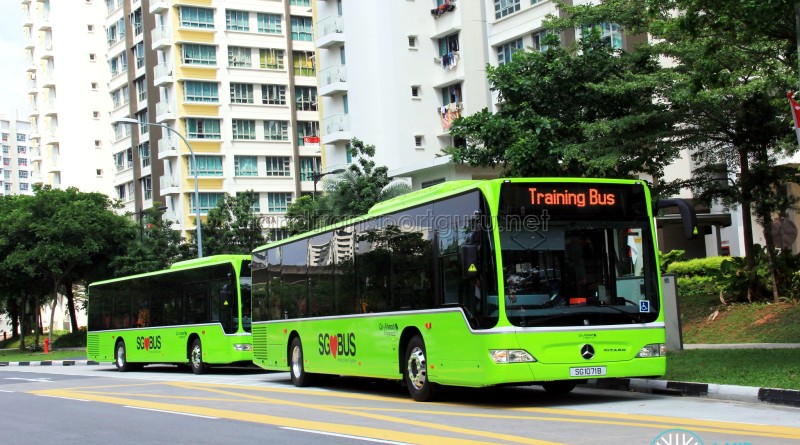
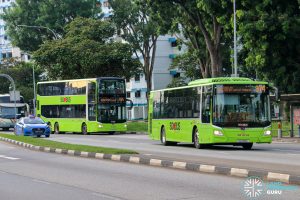
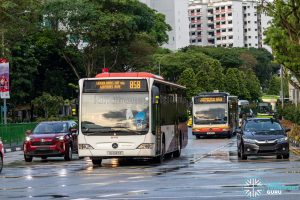
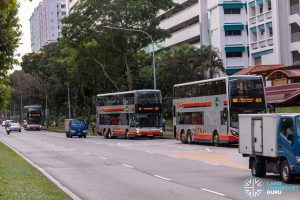
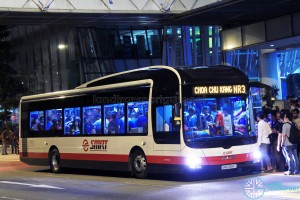
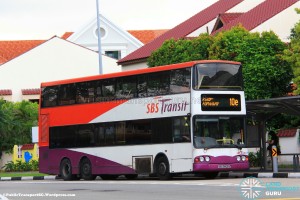
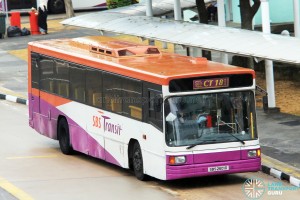
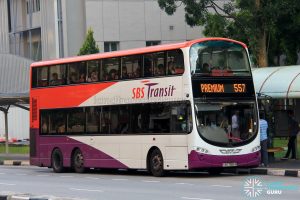
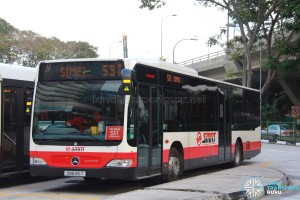
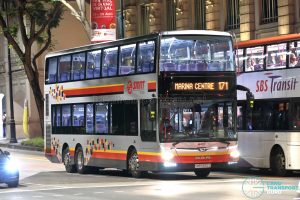
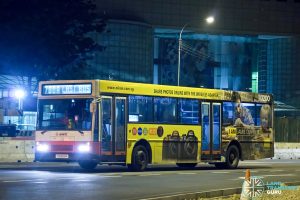
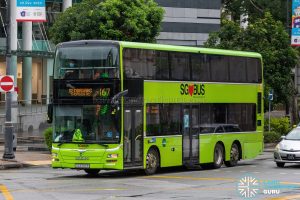
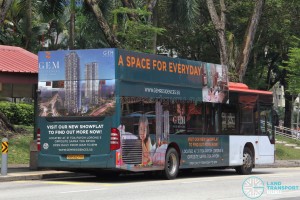
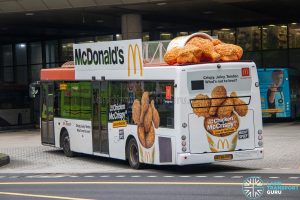
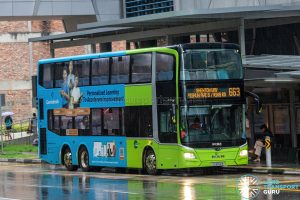
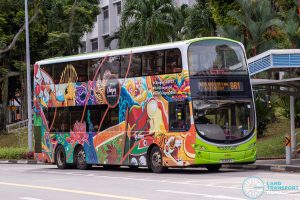
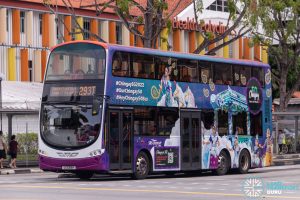
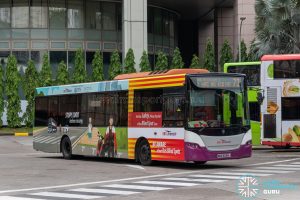
bulim got too much love recently. should remove services 96, 143, 282, 284, 285, 651 & 984 from bulim bcm. the latter two can give to SMRT under jurong west & cck-bpj respectively, 96 & clementi feeders go to clementi bcm while 143 give to bishan-toa payoh. in exchange bulim can take in 160, 506 & 993
Summary of bus packages, its region and the operators.
Tampines, Eastern and Go-Ahead SG.
Serangoon-Eunos, Northeastern/Central with unknown operator.(TBA).
Loyang,Eastern/Northeastern and Go-Ahead SG.
Choa Chu Kang-Bukit Panjang, Northwestern and SMRT Buses.
Woodlands, Northern and SMRT Buses.
Bedok, Eastern and SBS Transit.
Sengkang-Hougang, Northeastern and SBS Transit.
Sembawang-Yishun, Northern and Tower Transit SG.
Bulim, Western and Tower Transit SG.
Bukit Merah, Central/Southern and SBS Transit.
Jurong West, Western and SMRT Buses.
Clementi, Western and SBS Transit.
Bishan-Toa Payoh,Central and SBS Transit.
Seletar, Central/Northern and SBS Transit.
SBST
Bedok Sengkang-Hougang Bukit Merah Seletar Bulim.
SMRT
Choa Chu Kang-Bukit Panjang Loyang Woodlands.
GAS
Tampines Sembawang-Yishun Clementi.
TTS
Serangoon-Eunos Jurong West Bishan-Toa Payoh.
SBST HQ will be at Sengkang West and BOCC will be Sengkang West control Bedok too. Seletar standalone and Bulim control Bukit Merah too.
SMRT HQ will be at Gali Batu control Woodlands while Loyang is standalone.
GAS HQ will be at Tampines control Sembawang-Yishun while Clementi is standalone.
TTS HQ will be at Kim Chuan control Bishan-Toa Payoh while Jurong West is standalone.
All win2 dual control also not much problem.
SBST 168 BN/SE, SBST 30 BN/BU, SBST 143 BU/SW, Quite numbers of SE and BU can dual control with the future Pasir Panjang Depot like 133,77,97..
SMRT side 61 67 961 985 all can partial Loyang unless Loyang move to Lor Halus.
GAS side 7 can partial with EC, 10 and 65 partial with The future Ulu Pandan integrated depot.854 969 all can partial with EC.
TTS side 105 154 can partial with Soon Lee. 157 also with Soon Lee.
2026
Gali Batu & Woodlands might be extended for 3 years.
Sengkang West probably until 2028.
Loyang most probably extended to 2029.
Serangoon-Eunos a fight between SMRT Buses and SBS Transit.
2028
Bulim and Mandai might be awarded to new European operators.
From 2029 thing will get more interesting.
Tower seriously cannot make it in term of bus deployment… Keep on cutting cost by maximise buses.. Buses under maintenance. Terrible… Just terrible.